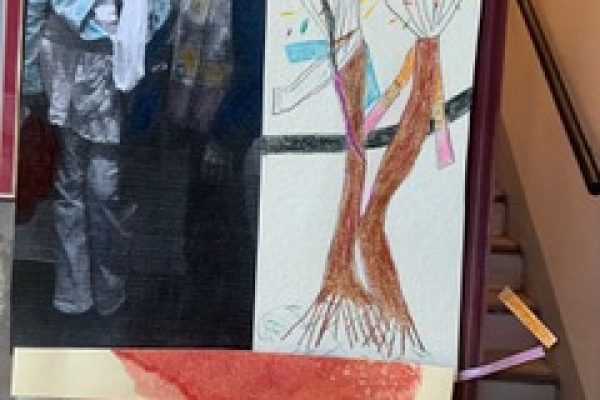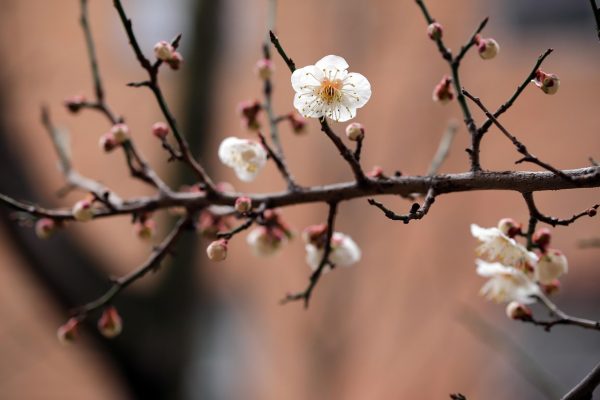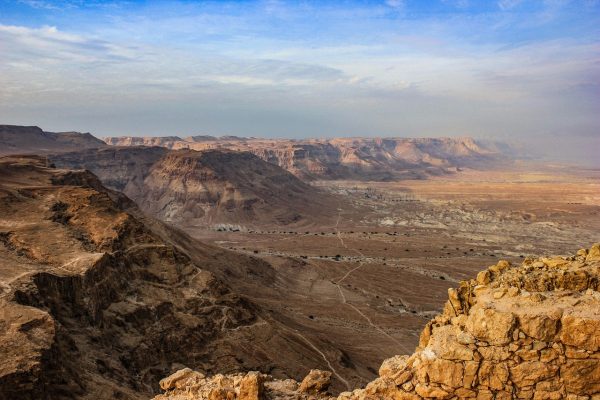Song: מַגָּל הַחַיִּים /Ma’gal Hahayim/Sustaining Life, Embracing Death
Text: Marcia Falk’s The Book of Blessings: New Jewish Prayers for Daily Life, the Sabbath and the New Moon Festival; Harper, 1996.
Music: Selections from Marcia Falk’s Blessings in Song by Linda Hirschhorn and Fran Avni, 1997.
נְבָרֵךְ אֶת הַמַּעַן
עֲדֵי עַד מְפַכֶּה
מַגָּל הַחַיִּים
הָמֵמִית וּמְחַיֶּה
N’vareykh et hama’yan
adey-ad m’fakeh –
ma’gal hahayim
hameymit umhayeh.
Let us bless the Well
eternally giving –
the circle of life
ever-dying, ever-living.
Prayer
We have been sustained and our souls protected and nurtured by the life of our beloved companion, ____________ , who has been taken from us.
The ragged tear death has rent in the fabric of our lives
cannot be mended.
Yet love is as strong as death, and the bonds of love
know no boundaries.
We still meet; we still love –
if not in the world of physical reality
then in the gentler world of dream and memory.
(adapted from Rami Shapiro)
Perspectives from Jewish Tradition
Rabbinic tradition makes clear God’s role as the caretaker of all forms of life: “The Holy One, blessed be God, sits and sustains [all life], from the horns of the wild oryx to the eggs of lice.” (Babylonian Talmud Shabbat. 107b)
“Human and creature You preserve, Adonai.” (Psalm 36:7) “In whose hand is the soul of every living thing and the breath of all humankind.” (Job 12:10) “You open Your hand and satisfy every living thing with favor.” (Psalm 145:16)
Created in God’s image, we, too, seek to sustain all life. In the Book of Samuel, the prophet Nathan tells David about the relationship of a poor man and a little lamb: “He tended it, and it grew up together with him and his children: it used to share his morsel of bread, drink from his cup, and nestle in his bosom; it was like a daughter to him.” (II Samuel 12:3) Such was this man’s bond of love for his animal companion.
Similarly, on a daily basis, many of us take care of our precious pets, our beloved animal-children, by feeding and sheltering them, by petting, walking, and playing with them. And, at the same time, in sustaining life, we are sustained. According to Rab, the sign of protection which God gave to Cain was a dog.” (Genesis Rabbah 22:12) Like Cain’s dog, our devoted companions protect and take care of us not only physically but also emotionally and spiritually. Ours is gratitude and reverence for their honest and humble example, generosity of spirit, and unconditional love.
Hesped/Eulogy
Honoring the life of the deceased.
Expressions of gratitude.
Perek Shirah
Prayer is a universal act which often celebrates the gift of life. In Perek Shirah, an ancient document of obscure origin, each of God’s creatures – plants and animals, mountains and rivers – sings out to its Creator in its own unique way.
(responsively or one verse/person)
The fish say: “The sound of the Almighty on the waters, the God of glory thundering, The Awesome One over the mighty waters.” (Psalm 29:3)
The bird says: “I lift my eyes up to the hills: from where does my help come?” (Psalm 121:1)
The snake says: “Support is God to all who fall, God raises up all those bent down.” (Psalm 145:14)
The elephant says: “How great are your deeds, Almighty One, your thoughts are very deep.” (Psalm 92:6)
The cat says: “Even should you rise as high as eagles, place your nest among the stars, even from there I’ll pluck you down, declares The Cunning One.” (Obadiah 1:4)
The mouse says: “I shall exalt you, O Redeeming One, for you delivered me and gave my enemies no joy on my account.” (Psalm 30:2)
The horse says: “Behold, like servants’ eyes toward their masters, like a handmaiden’s toward her mistress, so are our eyes toward Our Keeper that we might find favor.” (Psalm 123:2)
The sheep says: “The Eternal is my shepherd; I shall never be in need; God sets me down amid the choicest grasses, leads me by the calmest waters.” (Psalm 23:1-2)
(excerpted from Kol HaNeshamah. Shabbat Vehagim, pp 704-709)
Burial or Moment of Silence (for a lost animal companion)
(together) “… that which befalls the children of humans befalls the beasts;
one thing befalls them both;
as the one dies so does the other;
and both have the same lifebreath;
so that humans have no superiority over a beast;
since both amount to nothing.
Both go to the same place;
both came from dust, and both return to dust.” (Ecclesiastes 3:19-20)
El Malei Rachamim
(leader) El Malei Rachamim, God, exalted and full of compassion, grant perfect peace in Your sheltering Presence, among the holy and the pure to the spirit of ___________, who has gone to his/her eternal home. God of mercy, we ask you to remember the worthy contributions which he/she made in his/her lifetime. May his/her spirit be bound up in the bond of life. God is his/her portion; may he/she rest in peace. And let us say: Amen.
The Sh’ma
As a taste of the World to Come, the prophet Isaiah envisions harmony and unity within the animal kingdom:
“And the wolf shall dwell with the lamb;
And the leopard shall lie down with the kid;
And the calf, the young lion and the fatling together;
And a little child shall lead them.” (Isaiah 11:6)
Let us join together in declaring the Unity of God and all of God’s Creation:
(together)
Sh’ma Yisrael Adonai Eloheinu Adonai Echad
שְׁמַע יִשְׂרָאֵל, יְיָ אֱלֹהֵינוּ, יְיָ אֶחָֽד
Closing Song: Oseh Shalom
עֹשֶׂה שָׁלוֹם בִּמְרוֹמָיו, הוּא יַעֲשֶׂה שָׁלוֹם עָלֵיֽנוּ וְעַל כָּל יִשְׂרָאֵל וְעַל כָּל יוֹשְׁבֵי תֵּבֵל [וְעַל כָּל בְּרִיאוֹת], וְאִמְרוּ : אָמֵן
[masculine] Oseh shalom bimromav hu ya’aseh shalom aleinu v’al kol yisrael v’al kol yoshvei tevel [v’al kol b’reeot.]
עֹשֶׂה שָׁלוֹם בִּמְרוֹמָיו, הִיא תַעֲשֶׂה שָׁלוֹם עָלֵיֽנוּ וְעַל כָּל יִשְׂרָאֵל וְעַל כָּל יוֹשְׁבֵי תֵּבֵל [וְעַל כָּל בְּרִיאוֹת], וְאִמְרוּ : אָמֵן
[feminine] Osah shalom bimromav hee ta’aseh shalom aleinu v’al kol yisrael v’al kol yoshvei tevel [v’al kol b’reeot].
May the One who creates harmony above, make peace for us and for all Israel, and for all who dwell on earth [and for all creatures].
Primary source for textual citations:
Schochet, Elijah Judah. Animal Life in Jewish Tradition. Attitudes and Relationships. NY: Ktav Publishing House, Inc., 1984.
Suggested Activities:
Directly connected with the burial ritual:
–Build a headstone to be placed at the burial site.
–Plant catnip or a dogwood tree by the burial site.
Before or after the burial ritual:
–For a dog, follow his/her favorite walking route.
–For a cat, sit where he/she used to hang out outside or spend time in his/her favorite perch in the house.
–For a lost animal companion, follow the route you walked while searching for him/her.
During shloshim, the 30 days after burial:
–Volunteer at an animal shelter.
–Take a nature walk with human and animal friends in ________’s memory.
–Donate a book on animal care to a local library in ___________’s memory.












